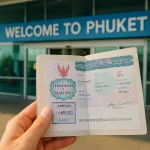The Ultimate Guide to Thailand Visas & Immigration
Thinking of living in Thailand long-term?
Not sure what visa suits you?
Worried you’ll overstay?
Confused by visa-on-arrival vs tourist visa vs LTR?
Let’s untangle it.
And yes, this entire piece is about Thailand visas & immigration.
Types of Thailand Visas & Immigration Routes
Thailand doesn’t do one-size-fits-all when it comes to visas.
You’ve got choices. And each choice depends on your purpose, your timeline, and your lifestyle.
The main visa categories you need to know:
- Tourist Visa (TR): 60 days, extendable by 30 days at immigration.
- Visa on Arrival (VOA): 15 days for eligible countries. Fee in cash. At the airport.
- Visa Exemption: 60 days (45 + 15 extension) for citizens of 90+ countries.
- Non-Immigrant Visa (O / B / ED / OA): For retirement, work, study, or marriage.
- Thai Elite Visa (Thailand Privilege Card): Long-term stay, 5 to 20 years, with perks.
- LTR Visa (Long-Term Resident): 10-year visa for wealthy retirees, digital nomads, and investors.
- DTV Visa (Destination Thailand Visa): Tailored for digital nomads & cultural explorers.
Each has its quirks. And the Royal Thai Embassy, the Thailand Immigration Bureau, and Siam Legal all have different roles in processing them.
What Do You Really Need? (Visa Finder Mode On)
Tourist?
Stick with the Thai Tourist Visa or Visa Exemption if you’re doing the island-hopping circuit.
Retiring at 50+?
You want the Retirement Visa (Non-OA). You’ll need 800,000 THB in a Thai bank or 65,000 THB/month pension.
Married to a Thai national?
Get a Marriage Visa (Non-O). Must show financial support (400k THB savings or 40k THB/month income).
Starting a business or working?
You’re after the Business Visa (Non-B) + a work permit.
Remote work or freelancing?
Apply for the DTV Visa. You’ll need to prove your income and show you’re working for clients abroad.
Got deep pockets?
The Thai Elite Visa gets you in for 5-20 years, no 90-day reporting, VIP airport perks, and re-entry sorted.
Invested in Thai real estate or bonds?
The LTR Visa is your best friend.
Inside Thai Immigration
Immigration in Bangkok can feel like Victorian bureaucracy meets tropical heat.
Expect forms. Expect queues. Expect visa agents.
Here’s how to make life easier:
- Get your documents translated and certified (use a Thai notary).
- Keep copies of everything: passport pages, visa stamps, TM30, TM6, etc.
- Don’t overstay: The fine is 500 THB/day, and bans can apply.
- Use the E-Visa portal (https://thaievisa.go.th) for tourist and some non-immigrant visas.
- 90-day reporting is real. Immigration wants to know where you live. You can file online, in person, or by post.
Visa Extensions, Re-Entry Permits & Common Slip-Ups
Can you extend a Thai visa?
Yes. Tourist visas can get 30-day extensions. Non-immigrant visas may be extended for 1 year.
Re-entry permit needed?
Yes. If you leave Thailand without one, your visa gets cancelled.
Common mistakes:
- Entering on Visa Exemption and trying to convert to long-term stay (can’t do that inside Thailand).
- Forgetting TM30 (address reporting) when you move.
- Booking a cheap visa run instead of extending properly.
- Assuming a visa = work permit (it doesn’t).
Related Reads from the PhuketCommunity.com
- Exploring Thai Soft Power Through Cultural Activities
- Best Hospitals and Health Clinics in Phuket
- How to Avoid Being Overcharged in Phuket
FAQs: What Google Users Are Asking
Can I work in Thailand on a tourist visa?
No. Working on a tourist visa is illegal and can lead to deportation.
How much is the Thai Elite Visa?
Starts at 900,000 THB for 5 years. Goes up to 5 million THB for 20 years.
Can I enter Thailand without a visa?
Yes, if you’re from a visa-exempt country. But you still need to follow rules and check for 60-day max stays.
Can I change visa types inside Thailand?
Sometimes. But it’s best done outside the country unless you already hold a Non-Immigrant visa.
What if I overstay my visa?
500 baht/day fine. Longer overstays = bans.
Final word?
If you’re thinking about Thailand visas & immigration, get your paperwork right, stay on top of reporting, and don’t assume you can fix things last minute.










